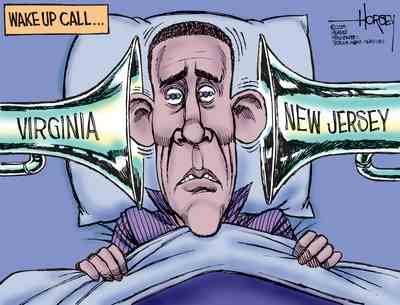- MENU
- HOME
- SEARCH
- WORLD
- MAIN
- AFRICA
- ASIA
- BALKANS
- EUROPE
- LATIN AMERICA
- MIDDLE EAST
- United Kingdom
- United States
- Argentina
- Australia
- Austria
- Benelux
- Brazil
- Canada
- China
- France
- Germany
- Greece
- Hungary
- India
- Indonesia
- Ireland
- Israel
- Italy
- Japan
- Korea
- Mexico
- New Zealand
- Pakistan
- Philippines
- Poland
- Russia
- South Africa
- Spain
- Taiwan
- Turkey
- USA
- BUSINESS
- WEALTH
- STOCKS
- TECH
- HEALTH
- LIFESTYLE
- ENTERTAINMENT
- SPORTS
- RSS
- iHaveNet.com: Politics
by Kenneth T. Walsh

Obama's Wake-Up Call (© David Horsey)
Face to face, President Obama seems even more unflappable, cerebral, and dispassionate than he appears on television. I interviewed him recently for the cover story in
But Obama's natural instinct is to keep his feelings to himself. During our interview in the Oval Office, he talked more like the law professor he was years ago in Chicago than the inspirational leader of the 2008 campaign. Sitting under a portrait of George Washington, the president gave a typically methodical analysis of how he makes decisions under crisis conditions, ranging from the economic meltdown that he faced on Day 1 to the ongoing wars in Afghanistan and Iraq.
"There are two aspects of this job that I think are relevant to this discussion," he said, measuring his words carefully. "One is that if the problem has a clear solution, then it doesn't land on my desk. Somebody else has solved it. So the only things I'm deciding on are things that are tough. And the second and related point is that because these are tough questions, you are always dealing to some degree with probabilities. You're never 100 percent certain that the course of action you're choosing is going to work. What you can have confidence in is that the probability of it working is higher than the other options available to you. But that still leaves some uncertainty, which I think can be stressful, and that's part of the reason why it's so important to be willing to constantly re-evaluate decisions based on new information."
I have interviewed each of the past five presidents-- Reagan, George H. W. Bush, Bill Clinton, George W. Bush, and now Obama--and Obama seems the most cerebral and the least emotional of them all. I was curious whether anything gets under his skin, makes him angry, or brings him to tears. His friends say if he did have an emotional reaction, it would happen in private and he certainly wouldn't want anyone talking about it publicly. Obama did let his feelings show during the campaign when his beloved grandmother, Madelyn Dunham, died, and he choked up while recounting how much she meant to him. But since becoming president, the closest he has come to showing strong emotion has been during his meetings with the families of soldiers killed in Iraq and Afghanistan or with troops who are recovering from injuries. George W. Bush's aides say he often wept during those meetings. Obama, by contrast, remains mostly stoic, although his aides say he is moved by the bravery and fortitude of America's men and women at arms.
When I asked Obama about such private encounters and how he feels about sending troops into harm's way, he was somber but controlled and almost seemed to be lecturing himself. "They are paying the ultimate price for our security," he said, "and so you'd better get those decisions right. And I feel a much greater weight when it comes to questions of war."
A senior Obama adviser says he thinks all this is fine with most Americans. The country is comfortable with Obama's intellectual approach after eight years of Bush's relying on his "gut reaction" to crises. And voters certainly prefer Obama's civility and cool to the fuming politicians who populate talk radio and cable TV shows. "Americans don't like anger, whether on the right or the left," says Democratic pollster Cornell Belcher, who advised Obama during the campaign.
What's important is connecting with everyday people, even if a leader does it dispassionately, Obama allies argue. "What leaders have to show is that they understand where voters are," Belcher says. "If voters think you share their vision of the world, that you share their values, that you can empathize, they trust you."
Obama's friends say he can get his dander up when he needs to. But as the president said during our interview, he prefers to base his judgments on "information and not emotions," and that isn't likely to change.
Receive our political analysis by email by subscribing here
AMERICAN POLITICS
WORLD | AFRICA | ASIA | EUROPE | LATIN AMERICA | MIDDLE EAST | UNITED STATES | ECONOMICS | EDUCATION | ENVIRONMENT | FOREIGN POLICY | POLITICS
© Tribune Media Services